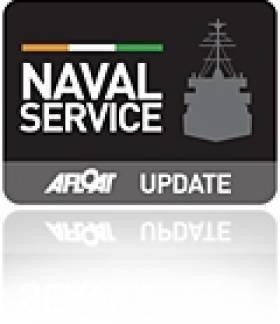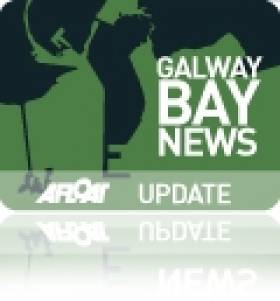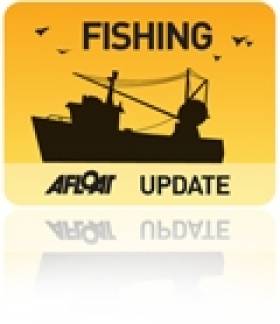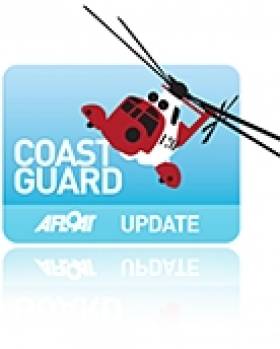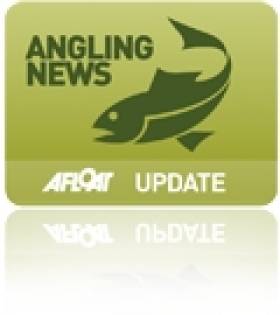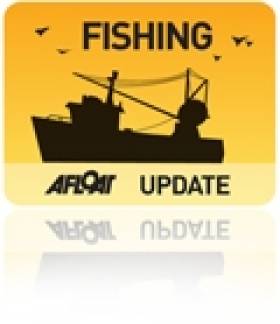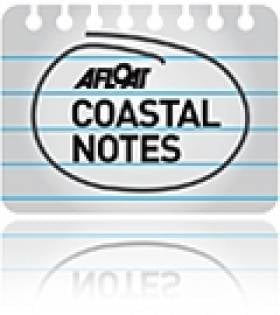Displaying items by tag: European Union
Make or Break Time for Fish Discards Ban
#FISHING - The Guardian reports that an alliance of EU member states plans to "hijack" a council meeting of the union's fisheries ministers today to prevent a ban on fish discards.
EU maritime affairs commissioner Maria Damanaki has stated her commitment to ending the practice, describing it as “unethical, a waste of natural resources and a waste of fishermen’s effort.”
Half of all fish in the North Sea - and up to two-thirds in other areas - are thrown back under the quota system implemented under the EU's common fisheries policy. The practice was recently highlighted by TV chef Hugh Fearnley-Whittingstall's 'Fish Fight' campaign.
Minister for the Marine Simon Coveney has called on EU states to support Ireland's effort to deal with fish discards, as previously reported on Afloat.ie.
But some member states, led by France and Spain, have dismissed the proposed ban as "unrealistic" and "too prescriptive", and will attempt to pass a declaration to allow the practice to continue indefinitely.
According to the Guardian, the charge is being led by industrial-scale fishing enterprises who want to retain the permission to discard lower value fish in order to maximise profits.
Brussels insiders say that if the declaration were to pass it would "kill the reform".
Ireland Could Join Effort to Battle Somali Pirates
#NAVAL SERVICE - Ireland could soon join the fight against Somali pirates in the Indian Ocean, the Irish Independent reports.
Minister of State Fergus O'Dowd confirmed that the Department of Defence was considering sending a personnel detachment to assist the EU's naval mission in the area west of Africa.
The region has been blighted by pirate attacks on merchant vessels and pleasure cruisers for a number of years.
Most recently, as reported on Afloat.ie, the situation prompted an interruption to the Volvo Ocean Race - with the six yachts shipped on a secret route to the United Arab Emirates under armed guard.
Ireland's potential contribution to the EU's Operation Atalanta is known as an autonomous vessel protection detachment (AVPD), and would be used to protect the likes of food aid ships from the World Food Programme that sail without a naval escort.
The Irish Independent has more on the story HERE.
NI Faces Big Fine Over Horse Mussels
#MARINE WILDLIFE - Northern Ireland faces a whopping £8 million (€9.6 million) fine from the EU over its failure to protect horse mussels.
According to BBC News, "little has been done" to protect horse mussel reefs in Strangford Lough despite promises from two government departments as far back as six years ago.
Last year Afloat.ie reported on a study from Queen's University Belfast that revealed the extent of damage to horse mussel reefs in the lough by fishing activity.
Strangford Lough is officially protected as a Special Conservation Area and a Marine Nature Reserve, as well as an Area of Special Scientfic Interest, but as BBC News states, "in reality there has been little protection put in place".
Horse mussels are pivotal to the lough's ecosystem, as some 100 other species rely on the reefs formed by the mussels in the seabed for their habitat.
NI officials now have just a few months to persuade the European Commission that they are taking strong action to protect the species, otherwise they will be charged with breaking EU directives.
BBC News has more on the story HERE.
British Boat Users Sailing Abroad Risk Fines Over Red Diesel
#NEWS UPDATE - British boat users are risking big fines if they sail their craft outside UK waters due to new laws on the use of red diesel, the Daily Telegraph reports.
New laws coming into force on 1 April "will require anyone moving into international waters to sign a declaration that their boat is not being powered by red diesel".
Red-dyed diesel is used by farmers and commercial fishermen throughout the UK at a lower rate of duty. It is also widely used by recreational boaters and yacht owners, as is green diesel by Irish pleasure boaters, though such users have been required to pay the full rate of tax for a number of years now.
However, the European Union is now clamping down on the use of dyed diesel.
The decision by Brussels is causing consternation among the yachting community, which argues that unmarked or 'white' diesel is not widely available in harbours and marinas.
And concerns remain over the presence of biofuels in white diesel which, as previously reported on Afloat.ie, can be harmful to marine engines.
The Daily Telegraph has more on the story HERE.
Management Plan for Galway Bay Fisheries On Track
#GALWAY BAY - Galway Bay FM reports that the National Parks and Wildlife Service is to work with the Marine Institute towards completing a management plan for Galway Bay.
It comes two weeks after a group of oyster fishermen met Minister for Natural Resources Pat Rabbitte at Leinster House to voice their concerns over a cap on oyster dredging licences.
As previously reported on Afloat.ie, local fishermen in the inner Galway Bay-Clarinbridge area are concerned that their livelihoods are at risk after the European Union ruled that there is over-intensification of fishing at the oyster bed.
Only 13 dredging licences have been issued this year, and EU Directives prevent their further issue until a fisheries management plan is introduced.
Galway West Senator Fidelma Healy-Eames says steps are being made to get the management plan on track.
Galway Oystermen Meet Minister Over Licence Cap
#FISHING - Fishermen from Galway met Minister for Natural Resources Pat Rabbitte at Leinster House yesterday to voice their concerns over a cap on oyster dredging licences, Galway Bay FM reports.
Local fishermen in the inner Galway Bay-Clarinbridge area are concerned that their livelihoods are at risk after the European Union ruled that there is over-intensification of fishing at the oyster bed.
Only 13 dredging licences have been issued this year, and EU Directives prevent their further issue until a fisheries management plan is introduced.
Italian Coastguard to Deliver Keynote at Dublin Conference
#COASTGUARD - Representaives of Italy's coastguard will give an account of its handling of the Costa Concordia tragedy at an international conference in Dublin next month, The Irish Times reports.
The Italian coastguard has been invited to deliver the keynote address at Search and Rescue 2012, which is being hosted in Ireland for the first time.
It is expected that this address will include a detailed account of the sinking of the cruise liner Costa Concordia last month.
At least 17 people have died and 12 are still missing after the ship ran aground on the western Italian coast. One Irish couple were among the thousands rescued from the stricken vessel.
Meanwhile, attendees at the conference - which is being hosted in the year of Ireland's charing of the EU coastguard network - will also witness demonstrations of the Irish Coast Guard's rescue helicopter fleet at Weston Airport in Leixlip.
As previously reported on Afloat.ie, Irish Coast Guard director Chris Reynolds has been charged with preparing the grounds for a permanent secretariat to be run by EU coastguard officers.
NI Taxpayers Could Foot the Bill for Fines Over Dwindling Salmon Stocks
#ANGLING - Northern Ireland's taxpayers could be left with a bill for millions in EU fines if action isn't taken to reverse the decline of salmon stocks, the News Letter reports.
Ulster Unionist MLA Robin Swann said he believes that voluntary measures to help protect the North's Altantic salmon will not remove the threat of "fines which would likely run into millions which [the people of NI] will end up paying".
As previously reported on Afloat.ie, NI's Fisheries Minister Carál Ní Chuilín called on offshore anglers and commercial fishermen to forego applying for 2012 salmon licences.
Annual monitoring of the North's salmon rivers has shown a failure to reach targets most years since 2002, with the survival rate of salmon in the marine phases in some cases dropping to as little as 5%.
Coastal drift nets and bag nets off the north Antrim coast - which contravene EU directives - have been blamed for intercepting salmon stocks before they reach the rivers, and anglers and conservation groups have already called for a ban.
But Swann says that Department of Culture, Arts and Leisure (DCAL) does not yet have the legislative power to stop them.
The News Letter has more on the story HERE.
Damanaki Promises 'Level Playing Field' in Common Fisheries Policy Review
The European Union's maritime affairs commissioner has promised a "level playing field" during the review of the Common Fisheries Policy (CFP), The Irish Times reports.
As previously reported on Afloat.ie, Maria Damanaki was in Dublin on Thursday to discuss reform of the policy with Irish stakeholders.
She admitted that Ireland had suffered under the current policy, which has led to overfishing in Irish waters by other EU member states such as Spain.
The commissioner said that better maritime planning and protection of "small-scale fisheries" were fundamental to the new CFP.
But she denied that Ireland's situation would worsen under the new proposals, which include concessions on transferable quotas that critics - including Minister for the Marine Simon Coveney - fear would see multinationals buying up Irish fishing rights.
She said similar concessions had worked in Denmark, the US, Australia and New Zealand, adding that the system is designed to compensate those who want to leave fishing without straining the EU's finances.
Damanaki also discussed encouraging the development of offshore aquaculture to combat rising imports of seafood, and her commitment to ending the practice of fish discards - which may also involve a programme to provide lower-income individuals with cheaper fish.
The Irish Times has more on the story HERE.
Ireland's Bathing Spots Among Cleanest in Europe
Ireland has ranked fifth in a new Europe-wide report on bathing water quality - but some beaches in Northern Ireland are falling short of strict EU standards.
MEP Jim Higgins welcomed the results of the annual Bathing Water Report for 2010, saying: "Ireland's scenic attributes are a primary reason for attracting tourists and it is essential that our coastal and inland bathing sites are also enticing."
Ireland has moved up five places from its overall rank of 10th in 2009, with 90.1% of all bathing water sites meeting the EU's Blue Flag guidelines for water quality at beaches and swimming spots.
However, the Daily Telegraph reports that a number of beaches in Northern Ireland and other parts of the UK were judged to be 'poor'.
Beaches at Newcastle and Ballyholme in the North are among 16 across the UK that did not pass the EU's strict checks for Blue Flags.
The 2010 report ranks Cyprus as the cleanest bathing spot in Europe, with 100% of sites passing EU insspection. It was closely followed by Croatia with 97.3%, Malta at 95.4% and Greece at 94.2%.



























